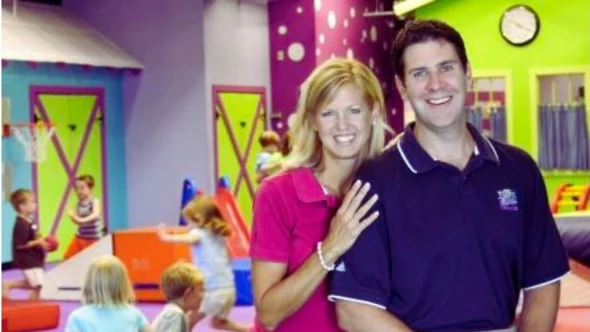
Founders Of Romp n’ Roll
Highlights
- The first season of Shark Tank saw diverse businesses, including fitness equipment and junk removal businesses.
- Romp n’ Roll founders entered Shark Tank in its inaugural season.
- Two regular judges proposed a deal to the entrepreneurs Babz and Michael Barnett.
Shark Tank Season 1 marked the beginning of creative business ideas that were driven to make new strides in the entrepreneurial space. From fitness equipment to pet supplements and junk removal ventures to pie-making businesses, a variety of pitches were brought to the investors.
Out of the many pitches presented in the first season, some managed to leave a mark even without getting a deal. Romp n’ Roll is an example of the same. Brought to the show by a Virginia-based couple, it showcased the idea of an indoor playground for kids.
Below is a complete discussion of its journey on the show, followed by its latest update:
Romp n’ Roll On Shark Tank Season 1
The entrepreneurial couple Babz and Michael Barnett tried their luck on Shark Tank Season 1 with their thoughtfully created activities center for kids. Pitching Romp n’ Roll as an ideal play center for children of different age groups (three months to six years old), they explained how the business combined learning with fun.
Based on the motto of ‘Nurture the genius. Unleash the goofball,’ the business also served for events, such as summer camps and birthday parties. The entrepreneurs sought $300K for 10% equity and wanted help with franchising Romp n’ Roll.
By the time of its appearance on Shark Tank Season 1, the venture was already placed in 10 different locations. Additionally, five years prior to its stint on the show, the company managed to have a huge profit margin of 30%. This was possible through its commendable annual revenue of $4 million.
Did Romp n’ Roll Get A Deal?
While the Sharks were intrigued by the business’s numbers, they were apprehensive about the proposed valuation. The negotiations started with Kevin O’Leary exiting the deal. He said Babz and Michael reminded him of his previous $3 billion investment in a different kids’ business.
Following him, Daymond John and Kevin Harrington also stepped out of the deal, citing the high valuation. Barbara Corcoran, too, decided not to invest, as one of her previous ventures in the same vertical had shut down.
Robert Herjavec was the only interested panelist who offered $300K for 51% equity. Hearing this, the entrepreneur couple stepped out to discuss the deal. In the meantime, Kevin O’Leary joined Robert on the deal.
The couple returned with a counteroffer of $300K at 20% equity, but Robert and Kevin denied it, and the entrepreneurs walked out empty-handed.
Romp n’ Roll After Shark Tank Season 1
Despite no deals on Shark Tank Season 1, Romp n’ Roll did well after the show. Within months of the episode’s airing, it enhanced its reach by finding a place in nine different locations in the US. In addition, the business started its first global franchise in 2009.
Its vision of expanding through franchising maintained momentum, and its decent presence spread across 300 different centers in China and the USA (as of 2021) maintained momentum. It also established another center in South Korea, thereby showing its potential in the Asian market.
Is Romp n’ Roll Still In Business?
Yes, Romp n’ Roll has been doing great after its Shark Tank journey. Its website is very active and shows that the business has solidified its presence across the country, including in states like Florida and Pennsylvania. The founders have also expressed their wish to open 10-15 new franchises every year.
The same can be seen on the Romp n’ Roll website, with locations such as New Jersey being reflected as ‘coming soon.’ The average revenue per unit for franchising opportunities is shown as $463K.
The success of Romp n’ Roll can be further ascertained from its annual revenue of $4 million.
Conclusion
Romp n’ Roll is an ideal example of perseverance, clear vision, and strategic growth. Even though it failed to bag a deal on Shark Tank Season 1, the entrepreneurs did not stop midway. They stayed committed to their vision of franchising the venture and cemented their presence in the US and China.
Additionally, small targets of establishing 10-15 new franchises every year helped it grow consistently, resulting in millions in revenue. The business reiterated that if entrepreneurs are true to their goals, they can thrive even without a Shark Tank deal.
References
- Romp n’ Roll Founders Don’t Regret ‘Shark Tank’ Snub, Franchise Times, Beth Ewen

Entrepreneur, auteur, raconteur. Rob Merlino is a blogger and writer who enjoys the Shark Tank TV show and Hot Dogs. A father of five who freelances in a variety of publications, Rob has a stable of websites including Shark Tank Blog, Hot Dog Stories, Rob Merlino.com and more.
Speak Your Mind